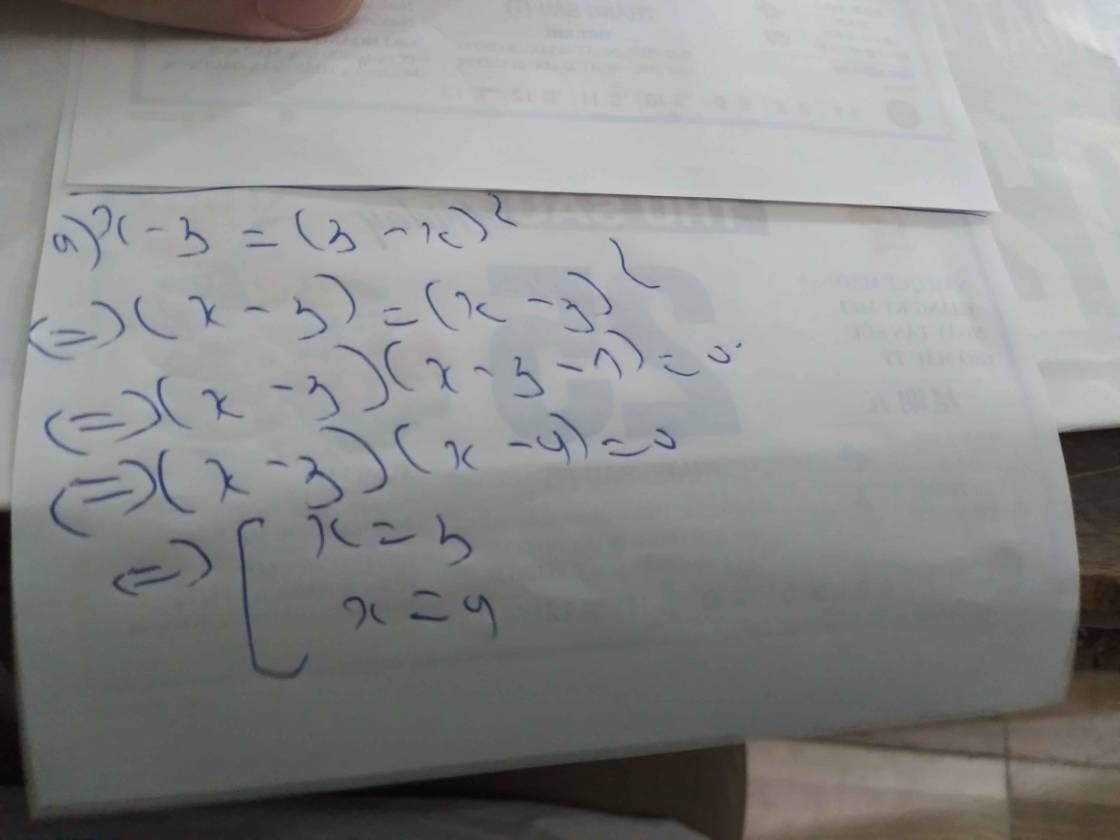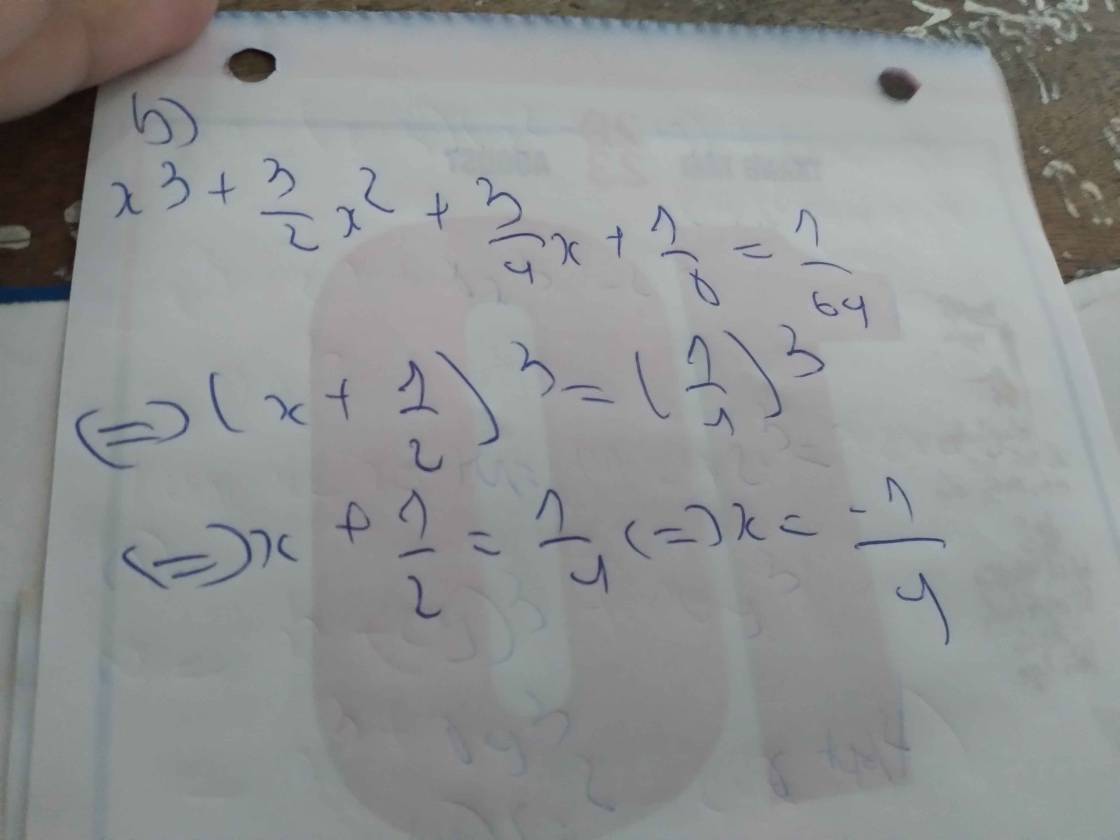TÌM x:
4x = 64
Hãy nhập câu hỏi của bạn vào đây, nếu là tài khoản VIP, bạn sẽ được ưu tiên trả lời.


a) \(x^2-64=0\)
\(\Leftrightarrow\left(x-8\right)\left(x+8\right)=0\)
\(\Leftrightarrow\left[{}\begin{matrix}x=8\\x=-8\end{matrix}\right.\)
b) \(4x^2-4x+1=0\)
\(\Leftrightarrow\left(2x-1\right)^2=0\Leftrightarrow2x-1=0\)
\(\Leftrightarrow x=\dfrac{1}{2}\)
c) \(9-6x+x^2=0\)
\(\Leftrightarrow\left(x-3\right)^2=0\)
\(\Leftrightarrow x-3=0\Leftrightarrow x=3\)
a: Ta có: \(x^2-64=0\)
\(\Leftrightarrow\left(x-8\right)\left(x+8\right)=0\)
\(\Leftrightarrow\left[{}\begin{matrix}x=8\\x=-8\end{matrix}\right.\)
b: Ta có: \(4x^2-4x+1=0\)
\(\Leftrightarrow\left(2x-1\right)^2=0\)
hay \(x=\dfrac{1}{2}\)
c: ta có: \(x^2-6x+9=0\)
\(\Leftrightarrow\left(x-3\right)^2=0\)
hay x=3

\(\left(x-3\right)=\left(3-x\right)^2\)
\(\Leftrightarrow x-3=\left(x-3\right)^2\)
\(\Leftrightarrow\left(x-3\right)-\left(x-3\right)^2=0\)
\(\Leftrightarrow\left(x-3\right)\left[1-\left(x-3\right)\right]=0\)
\(\Leftrightarrow\left(x-3\right)\left(4-x\right)=0\)
\(\Leftrightarrow\left[{}\begin{matrix}x-3=0\\4-x=0\end{matrix}\right.\)
\(\Leftrightarrow\left[{}\begin{matrix}x=3\\x=4\end{matrix}\right.\)
___________
\(x^3+\dfrac{3}{2}x^2+\dfrac{3}{4}x+\dfrac{1}{8}=\dfrac{1}{64}\)
\(\Leftrightarrow x^3+3\cdot\dfrac{1}{2}\cdot x^2+3\cdot\left(\dfrac{1}{2}\right)^2\cdot x+\left(\dfrac{1}{2}\right)^3=\dfrac{1}{64}\)
\(\Leftrightarrow\left(x+\dfrac{1}{2}\right)^3=\left(\dfrac{1}{4}\right)^3\)
\(\Leftrightarrow x+\dfrac{1}{2}=\dfrac{1}{4}\)
\(\Leftrightarrow x=\dfrac{1}{4}-\dfrac{1}{2}\)
\(\Leftrightarrow x=-\dfrac{1}{4}\)

a)\(x^{23}=64.x^{20}\)
\(\Leftrightarrow\frac{x^{23}}{x^{20}}=64\)
\(\Leftrightarrow x^3=64\Rightarrow x=4\)
b)\(\left(4x-3\right)^4=3-4x\)
\(\Leftrightarrow\left(3-4x\right)^4=3-4x\)
\(\Leftrightarrow\left(3-4x\right)^3=1\)
\(\Leftrightarrow3-4x=1\)
\(\Leftrightarrow x=\frac{1}{2}\)

\(x^3+\dfrac{3}{4}x+\dfrac{3}{2}x^2+\dfrac{1}{8}=\dfrac{1}{64}\)
\(\Leftrightarrow x+\dfrac{1}{2}=\dfrac{1}{4}\)
\(\Leftrightarrow x=-\dfrac{1}{4}\)

a: 3x=81
nên x=27
b: \(5\cdot4^x=80\)
\(\Leftrightarrow4^x=16\)
hay x=2
c: \(2^x=4^5:4^3\)
\(\Leftrightarrow2^x=2^4\)
hay x=4

=>27x^3+x^3-125+64=4x^3-27
=>28x^3-61=4x^3-27
=>28x^3-4x^3=27+61
=>24x^3=88
=>x^3=11/3
=> x=....


<=> \(\sqrt{64\left(x+1\right)}-\sqrt{25\left(x+1\right)}+\sqrt{4\left(x+1\right)}=20\)
<=> \(8\sqrt{\left(x+1\right)}-5\sqrt{\left(x+1\right)}+2\sqrt{\left(x+1\right)}=20\)
<=> . \(5\sqrt{\left(x+1\right)}=20\)
<=> \(\sqrt{\left(x+1\right)}=4\)
=> x+1=16
=> x=15



43 = 64
\(4^x=64\)
\(\Rightarrow4^x=4^3\)
\(\Rightarrow x=3\)
Vậy x = 3
_Chúc bạn học tốt_